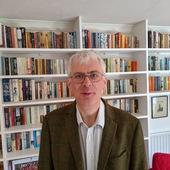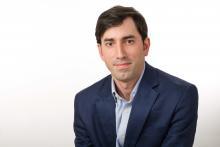Lord Haw-Haw: popularity of wartime Nazi propagandist made the BBC up its game

During the second world war, Nazi Germany banned all listening to foreign radio stations. Germans who overlooked their duty to ignore foreign broadcasts faced penalties ranging from imprisonment to execution. The British government imposed no comparable ban which would have been incompatible with the principles for which it had gone to war. That’s not to say, though, that it wasn’t alarmed by the popularity of German stations.
Most effective among the Nazis broadcasting to the UK was William Joyce. This Irish-American fascist, known in Britain as “Lord Haw-Haw”, won a large audience during the “phoney war” in 1939 and early 1940, with his trademark call sign delivered in his unmistakable accent: “Jairmany calling, Jairmany calling”.
During this period, when fighting felt remote from British homes, Joyce became a celebrity. He was genuinely amusing, and he emphasised the socialist aspect of National Socialism in a manner calculated to appeal to British Labour voters.
One topic for attack was rationing, on which Haw-Haw made such effective criticism of Neville Chamberlain’s government that Harold Hobson, a prominent drama critic and author, wrote to The Times in December 1939 to praise his style as a broadcaster. Haw-Haw, wrote Hobson, had increased the nation’s Christmas cheer with his jibe that rationing restricted Britons to “a quarter-pound of butter a week”.
Hobson deplored the BBC’s failure to rebut Haw-Haw’s arguments. He recognised that Haw-Haw made an impact because he faced no contradiction. Hobson warned that the Nazi propagandist had become “a figure of national popularity… the hero of the revue”.
Olivia Cockett, a diarist for the Mass Observation project that recorded the everyday thoughts of British people of the period, illustrates the popularity of such broadcasts. Her diary entry for October 13 1939 records that she “took tea up to my sitting room to listen to the German news in English… They sound mostly quite as reasonable and convincing as the BBC so that I am more than ever wondering where the TRUTH lies”.
‘Diabolical Peter Wimsey’
The idea that Haw-Haw was a privileged member of the upper classes also gained widespread currency – and reinforced the belief that he might have access to important information. Media historian Jean Seaton notes that: “The myth of the English aristocrat with inside knowledge of the German high command – a kind of diabolical Peter Wimsey – was powerful.”
It inspired controversy at The Times. On January 2 1940, a letter from the novelist Rose Macaulay disputed Harold Hobson’s suggestion that Haw-Haw sounded upper class. Macaulay acknowledged that he “speaks excellent English”, but she did not believe it to be “public school” English. Indeed, she detected “a slight provincial accent” – perhaps Manchester?
Macaulay invited other readers to share their opinions. Six days later, The Times collated their responses in a news story. One reader was perceptively certain that Haw-Haw’s speech indicated that he had Irish origins. Another detected “the pomposity and condescension associated with privilege and class”. AS Pratt, the headmaster of King Edward VI School in Nuneaton added: “His broadcasts are a joy and he has added to the gaiety of nations.”
This capacity to entertain alarmed the popular, left-of-centre Daily Mirror. It supported Hobson’s suggestion that the BBC should rebut Haw-Haw’s assertions. If it was true that:
innocent folk listening to Haw-Haw have indeed begun to fall under the spell of his prestige [then] some equally bland announcer should answer him back every evening and refute the most perilous part of his propaganda, which is probably his not unskillful appeal to socialist and anti-imperialist suspicions.
The conservative Daily Mail was equally aware that its readers enjoyed Haw-Haw. It deprecated his “vicious little wisecracks” and deplored his “insinuating questions”. It rejoiced when he was briefly replaced on the airwaves by another English-speaking Nazi broadcaster, a man “with the faint brogue of the cultured North Countryman” whom it christened “Soapy Sam”. But he lacked Haw-Haw’s ability to amuse. The following day, the Daily Mail recorded that “Lord Haw-Haw’s monocled voice reached out from Bremen again last night and British listeners are happy once more”.
BBC gets the message
Writing in the BBC’s own magazine, The Listener, in January 1940, Mr Charles of Herne Hill expressed his fear that consistent bombardment by such propaganda might lead British listeners to question the accuracy of the BBC’s own reporting. He feared that “the only solution will be to emulate Germany’s example and make it an offence to listen to foreign broadcasting”.
But tempting though it was, a ban on listening would make a mockery of Britain’s commitment to democratic principles. American opinion would be outraged. The solution was not censorship but a determined effort to raise the entertainment value of BBC radio. Lord Haw-Haw played a part in shifting the BBC away from its policy of ignoring popular preferences to an understanding that “the barometer of listeners’ preferences” should help to define its output.
Great wartime radio shows were devised that attracted colossal audiences and made the image of a family gathered around a radio set genuinely representative of wartime Britain. Soon, radio overtook newspapers as Britain’s primary source of news.
Joyce, meanwhile, was captured in Germany in May 1945 and convicted of high treason. He was hanged at Wandsworth Prison in London on the morning of January 3 1946.
Tim Luckhurst, Principal of South College, Durham University
This article is republished from The Conversation under a Creative Commons license. Read the original article.


















